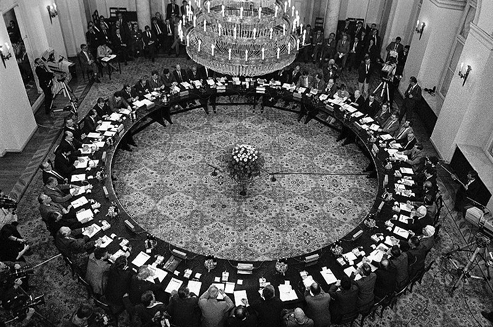In the late 1980s social protests were surging throughout the communist Poland, sparked off by miserable economic conditions. The opposition grew stronger after a decision by Mieczysław Rakowski, the then prime minister, to close down the Gdansk Shipyard, a birthplace of the “Solidarity” movement which had been made illegal during the martial law. The communist leaders decided to start informal talks with some members of the opposition, which had already been active for a decade. This led to the Round Table negotiations.
The talks were held from February 6th to April 5th 1989 in the Column Hall of the Vice-Regal Palace—now the Presidential Palace—at Krakowskie Przedmieście street, Warsaw, and brought together representatives of the Polish People’s Republic (PRL) government, Solidarity-linked opposition activists led by Lech Wałęsa, and the Roman Catholic Church.
As a result of the Round Table negotiations, Solidarity was again legalised and the first partially free elections to the PRL’s Sejm and Senate took place on June 4th 1989. Contrary to the authorities’ expectations, the Polish United Workers’ Party (PZPR) was utterly defeated and the democratic opposition candidates took nearly all the seats.
The Round Table and the June elections to the so-called Contract Sejm marked the beginning of changes which paved the way for forming the government of Prime Minister Tadeusz Mazowiecki, the first non-communist cabinet in this part of Europe. In the autumn of 1990, completely free presidential elections were held, bringing to power Lech Wałęsa, Solidarity’s famous leader.
Poland’s transformation, symbolised worldwide by the Round Table, ushered in the beginning of an end of the non-democratic system of power which had been forcefully imposed on the Central and Eastern European states and maintained by the Soviet Union. Ten years later, in the very same Column Hall, Poland’s accession treaty to NATO was signed and, in 2003, the Accession Treaty to the European Union was ratified.
Photo © Erazm Ciołek
Source: Ministry of Foreign Affairs


